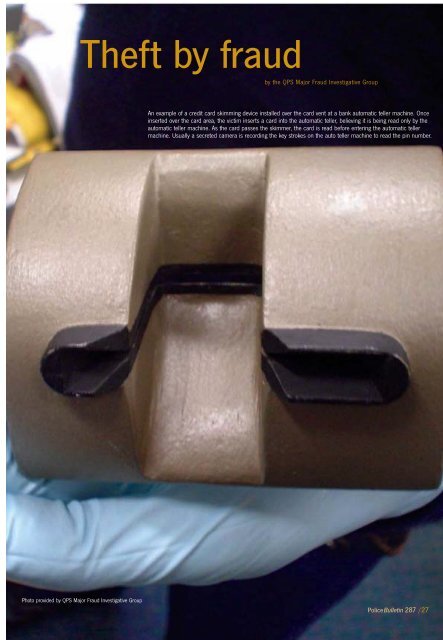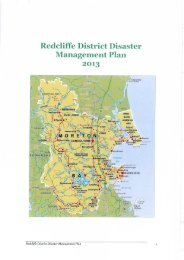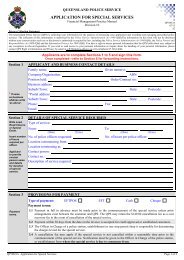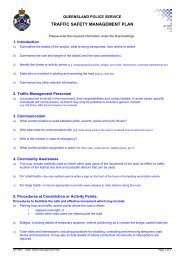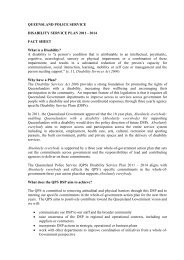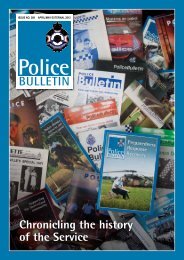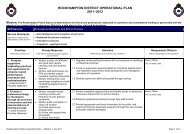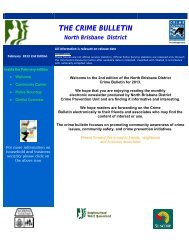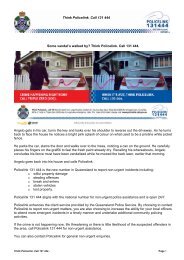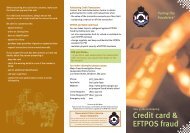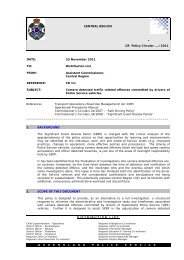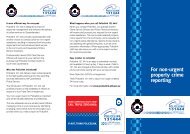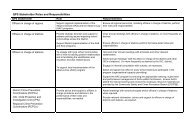Theft by fraud - Queensland Police Service
Theft by fraud - Queensland Police Service
Theft by fraud - Queensland Police Service
You also want an ePaper? Increase the reach of your titles
YUMPU automatically turns print PDFs into web optimized ePapers that Google loves.
<strong>Theft</strong> <strong>by</strong> <strong>fraud</strong><br />
<strong>by</strong> the QPS Major Fraud Investigative Group<br />
An example of a credit card skimming device installed over the card vent at a bank automatic teller machine. Once<br />
inserted over the card area, the victim inserts a card into the automatic teller, believing it is being read only <strong>by</strong> the<br />
automatic teller machine. As the card passes the skimmer, the card is read before entering the automatic teller<br />
machine. Usually a secreted camera is recording the key strokes on the auto teller machine to read the pin number.<br />
Photo provided <strong>by</strong> QPS Major Fraud Investigative Group<br />
<strong>Police</strong>Bulletin 287 /27
According to the Australian<br />
Government, <strong>fraud</strong> is currently the most<br />
expensive category of crime in Australia.<br />
Standards Australia has suggested that the cost<br />
to the Australian economy is three billion<br />
dollars per year. It warns that both the<br />
incidence and the financial impact of <strong>fraud</strong> is<br />
increasing year <strong>by</strong> year, as is the average<br />
financial loss associated with <strong>fraud</strong>ulent<br />
conduct.<br />
It is also noted in Standards Australia 2003<br />
publication 2003 Fraud and Corruption Control<br />
that a significant portion of cases of detected<br />
<strong>fraud</strong> are not reported to police for<br />
investigation.<br />
Their research indicates that:<br />
• identity theft is becoming the most<br />
important <strong>fraud</strong> related threat within the<br />
Australian economy<br />
• Australian organisations are ill prepared to<br />
detect and prevent <strong>fraud</strong>.<br />
Detective Superintendent Kev Robinson from<br />
the <strong>Queensland</strong> <strong>Police</strong> <strong>Service</strong> (QPS), Major<br />
Fraud Investigation Group said business and<br />
the community needed to be better informed<br />
about the current trends of <strong>fraud</strong> to develop<br />
strategies to minimise the risk of becoming a<br />
victim.<br />
“Globalisation and the advancements in<br />
computer technology present ever increasing<br />
challenges to law enforcement. Identity theft<br />
and computer <strong>fraud</strong> utilising techniques such<br />
as ‘Phishing’ and ‘Trojan Virus’ can be<br />
devastating to business and individuals,” he<br />
said.<br />
General <strong>fraud</strong><br />
Fraud is generally described as gaining a<br />
benefit <strong>by</strong> deception and usually results in<br />
financial or material loss to the victim.<br />
There are numerous types of <strong>fraud</strong> that can be<br />
perpetrated on an individual or business. Such<br />
<strong>fraud</strong>s include:<br />
• <strong>fraud</strong>ulent investment schemes<br />
• <strong>fraud</strong>ulent property and real estate schemes<br />
• misuse of trust funds <strong>by</strong> lawyers and<br />
accountants<br />
• criminal or unethical behaviour <strong>by</strong> directors<br />
of companies<br />
• insurance <strong>fraud</strong><br />
• share market/prospectus <strong>fraud</strong><br />
• misuse of power of attorney<br />
• significant employee or employer theft or<br />
<strong>fraud</strong><br />
• government sector <strong>fraud</strong><br />
• arson for financial gain<br />
• cheque <strong>fraud</strong><br />
• impersonation<br />
• misappropriation through a variety of<br />
representations<br />
• ‘too good to be true’ scams<br />
Identity <strong>fraud</strong><br />
Identity theft refers to the theft and use of<br />
personal information of an actual person as<br />
opposed to the use of a fictitious identity.<br />
This can include the theft and use of<br />
identifying personal information of someone<br />
who is dead or alive.<br />
Identity theft happens in a multitude of ways.<br />
It can range from someone using credit cards<br />
illegally to make purchases over the Internet<br />
or telephone, through to having someone’s<br />
entire identity assumed <strong>by</strong> another person to<br />
open bank accounts, take out loans, make a<br />
tax return and conduct other business<br />
illegally in their name.<br />
In many cases the victim will not know that<br />
they have been de<strong>fraud</strong>ed for some time. At<br />
that point they may have suffered<br />
considerable financial loss and their personal<br />
credit ratings can be destroyed.<br />
Internet theft<br />
‘Phishing’ is a technique used <strong>by</strong> criminals to<br />
gain personal information for the purposes of<br />
identity theft and <strong>fraud</strong>ulent activity. It is<br />
most commonly achieved <strong>by</strong> an email<br />
message that appears to come from a<br />
legitimate financial institution and in some<br />
cases replicates the home page of that<br />
business.<br />
These authentic looking messages are<br />
designed to lure recipients into divulging<br />
personal data such as account numbers,<br />
passwords, or credit card details.<br />
“No legitimate financial institution would ever<br />
ask you to divulge account and password<br />
details in an email message,” said Detective<br />
Superintendent Robinson.<br />
“Anyone who receives such a request should<br />
not reply to the email or click on any link<br />
contained within the message. They should<br />
immediately contact the institution <strong>by</strong><br />
telephone.”<br />
‘Trojan viruses’ are covert computer programs<br />
placed on a victim’s computer without their<br />
knowledge to enable the perpetrator to access<br />
details on the computer from a remote<br />
location.<br />
It allows the remote users unrestricted access<br />
to the programs, data and security features of<br />
that computer. This enables the remote user to<br />
control someone’s personal computer and<br />
extract and use that information for personal<br />
gain.<br />
This invasion of privacy can have a devastating<br />
effect on a person’s reputation, business and<br />
financial affairs.<br />
“Those businesses or individuals who have<br />
effective risk management processes or audit<br />
practices in place greatly reduce the risk of<br />
becoming a victim of <strong>fraud</strong>,” Detective<br />
Superintendent Robinson said.<br />
“People should ensure that they have an up-todate<br />
antivirus program and a firewall installed<br />
on their computer, which protects the<br />
computer while on-line.”<br />
To obtain more information about further<br />
preventing Internet or identity <strong>fraud</strong> or need to<br />
report suspected <strong>fraud</strong>ulent activities visit<br />
www.police.qld.gov.au and search under<br />
‘programmes’ then ‘crime prevention’; attend<br />
your local police station to report offences or<br />
make an inquiry or report all suspected<br />
<strong>fraud</strong>ulent activity to Crime Stoppers on 1800<br />
333 000.<br />
Other useful Internet sites include:<br />
• Australian Securities and Investments<br />
Commission http://www.asic.gov.au<br />
• Australian Competition and Consumer<br />
Commission http://www.accc.gov.au<br />
• <strong>Queensland</strong> Office of Fair Trading<br />
http://www.fairtrading.qld.gov.au<br />
For further information on how the Major Fraud<br />
Investigation Group can help you or your<br />
business, please contact: Major Fraud<br />
Investigation Group on telephone 3364 6622.<br />
28/ <strong>Police</strong>Bulletin 287
Credit card merchants provide educational<br />
cards to show retail businesses what<br />
security features to look for.<br />
<strong>Police</strong>Bulletin 287 /29
How to prevent becoming a victim of <strong>fraud</strong><br />
General Fraud<br />
• Develop a healthy trust relationship with your professional financial or legal advisor.<br />
• Store valuable personal documents i.e. Wills, Powers of Attorney, Securities, and Bonds etc in secure places.<br />
• Seek alternate additional professional advice concerning any financial investments.<br />
• Beware of financial investment and taxation minimisation schemes that seem ‘too good to be true’.<br />
• Store your chequebooks in a secure location within your residence or business premises.<br />
Identity Crime<br />
• Check your credit record or banking statements frequently.<br />
• Place passwords on all your important accounts and records.<br />
• Memorise passwords; do not keep the password in your possession.<br />
• Secure your personal information (Passport, birth certificate, etc).<br />
• Don’t carry personal information with your unless you need to.<br />
• Destroy personal information before disposal (i.e. shred, cut up expired cards).<br />
• Avoid giving personal information over the telephone, <strong>by</strong> mail or the Internet.<br />
• Secure your mailbox with a lock. Check contents regularly.<br />
• Check billing and account records carefully for unfamiliar entries.<br />
• Limit the amount of credit you have in your Internet bank accounts.<br />
• Treat with caution any request for your email details for mailing accounts.<br />
• When paying with a credit card at restaurants and general businesses using credit or electronic banking facilities (EFTPOS) always keep<br />
the credit card in your sight. (To avoid unlawful skimming).<br />
• When banking at an ATM, familiarise yourself with the ATM and inspect any unusual card reading slots attached to the machine.<br />
• Avoid shoulder surfing (observing you type your password) <strong>by</strong> other people in the proximity of you at an auto-teller machine.<br />
• When undertaking transactions of people using a credit card, be mindful of the common design and security features. Ensure that the<br />
card being used is authentic to the best of your knowledge.<br />
Computer ‘Phishing’ and ‘Trojan Viruses’<br />
• Always use passwords.<br />
• Update and change your password regularly.<br />
• Do not use automatic log on features that save your user name and password.<br />
• Always log off your computer when you have finished using it.<br />
• Use the latest protection software eg anti virus protection and encryption.<br />
• Use a personal firewall to secure your PC when online.<br />
• Beware of unsolicited emails. Do not follow up or reply. Delete without opening.<br />
• Only conduct business transactions with secure websites eg banks, financial institutions and reputable business institutions.<br />
• Regularly back up the information in your computer. Wipe the hard drive if you sell or dispose of your computer, ensuring that all files you<br />
created are rendered unrecoverable.<br />
• Avoid using computers that are available to the general public to access your private personal information as your password and credit<br />
card details may be compromised.<br />
30/ <strong>Police</strong>Bulletin 287


